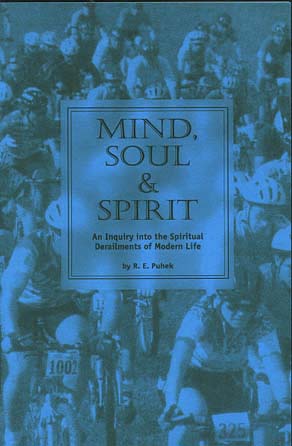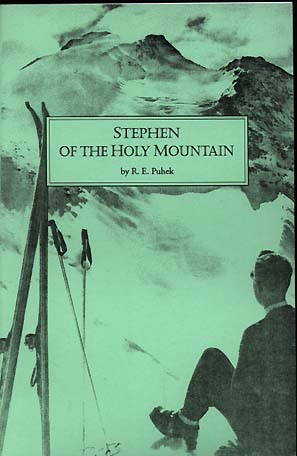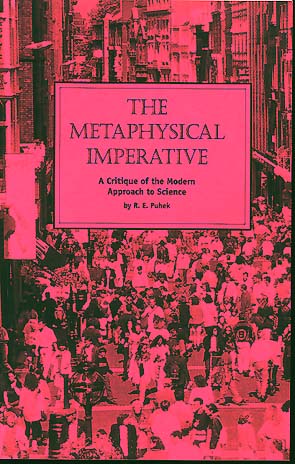The entire line of 5th Way books comes to you courtesy of me. 5th Way is an imprint of the OYB empire.
So, what’s 5th Way? And what is a buncha philosophy books written by one guy doing at the OYB dot com?
Waaaahhlll, Ron Puhek’s philosophy is *integrative*. That there fits with OYB right off the bat.
Secondly, they’re not really philosophy, so if you don’t like that, it’s not it anyway. Like many OYB projects, it’s neither fish nor fowl. Here’s what the author says…
“I would not identify my works as religious, psychological, or even philosophical. I use a lot of religious references, but the purpose is to illuminate life processes. I think specifically of the movement of human liberation. Unfortunately, the ways I think of expressing this sound depressingly ‘new age.'”–Ron Puhek
Puhek is a recently retired MSU professor—he was an undergrad lecturer whose only interest was the welfare of his students and so he was invisible in the faculty (a good sign, to me). He’s been hosting a weekly reading meeting at his house for over 30 years. All ages and types gather there to have dessert (that he makes from scratch–another good sign) and to discuss some book in an attempt to find how it can help our lives today. We tend to read ‘big’ books that are hard to get through alone. We read novels, philosophy, politics, religion, poetry—from the West, East and in between. It’s a book club with a mission…from before there were book clubs. I find it to be a unique effort, both challenging and civil, and have been part of it for 15+ years.
The approach we use is something we decided to call the Fifth Way. So I have a Fifth Way Press that’s an imprint of OYB. The press is sponsored by the MIEM, the Michigan Institute of Educational Metapsychology—a fancy, tongue-in-cheek name for our get-together that means “studying and teaching a philosophy for living today, inspired by the best of the past.” The institute passed around these writings in a form of samizdat prior to this publication. Group members are often people from the ‘helping’ professions who see that their ways need help as they watch the System try to eat them and everyone else alive. It also includes college students who see that they need help to stay true to what they are learning. We’re all exasperated by what’s out there and work to find a way to grow anyway.
Here’s a link to Ron’s own website: www.msu.edu/~puhek/. It includes relevant essays, poems and a nifty music file. You can see if what I’m saying meshes with his own words.
I wish we kept a list of all the books we’ve read! Also, some video and audio recordings of our meetings might be good to have.
The Fifth Way concept stems from the Fourth Way of Gurdjieff. The traditional three ways to contact reality are: the emotional way of the monk, the intellectual way of the yogi, and the physical way of the fakir. These were joined in the 1920’s (or so) by Gurdjieff’s fourth way of the householder: one who learns from everyday life. The Fifth Way takes the best of all ways without leaving any behind, transcending them all: count your fingers: thumbs up!
Now, Gurdjieff also has the reputation of being an early east-west cult leader con man. And his notions have been abused as often as they’ve been used. But it seems like there’s something to it all. Something helpful amidst the flimflam.
How is the Fifth Way not more of the same? Well, I believe there are tests you can make for cults. There’s science on it, even. Cults are known by telltales such as isolation, expense, exploitation, abuse of all kinds, us’n’them vibes, outlandish promises and rules. (Mainstream religion in some cases would seem to qualify as well as any of the freakshows.) Our little 5th Way has none of this. Just folks of all ages showing up to read and make an effort together, lo these past 40 years.
Basically, if you like Simone Weil and the ancient desert writers such as St. John of the Cross or St. Teresa, you’ll like Puhek. It’s plainly written but intense philosophy for a modern age. His reflections integrate and build on many works, especially Plato, Sartre, Jung and Freud.
And if this isn’t enough for you, check out this link for prefaces and full text downloads of most Fifth Way titles available here!
A simple way of looking at it is that we declare the Fifth Way to be a methodology of freedom. It’s a method you can use to live free.
Freedom is easy to lose in our world. So we thought it deserved special attention.
There are other integrative “life process” books out there, but not many. Schumacher’s “Guide for the Perplexed” and “Small is Beautiful” and his holistic thinking are close to what I offer here. These OYB books take such ideas and run farther with them.
Some of the books here offer a unique and much-needed twist on the Judeo-Christian view that forms the basis of the western mind (whether we practice it or not). But it urgently takes these ideas past today’s childish and exploited views.
They all look at modern culture in a “new old” way that I hadn’t seen before. They do a great job of breaking through to reveal both the disasters and powers of modernism. Their ideas are not part of today’s discourse: they are fresh and original. One of the main points is that today’s kind of criticism feeds into and indirectly worsens the problems.
Another reason why they’re with OYB is that none of these books are in anyone’s camp. Everyone is shaken and challenged to escape the machine from within and without. But neither are any ideas dismissed just because they’re out of style. Pure OYB!
I find that they particularly help me with my relation to my many hobbies and to my work. –Another way they might benefit OYBers. They pay a lot of attention to our modern goodies, lifestyles and education.
I’ve seen many contemporary questing titles: nearly all leave a lot to be desired and are hardly on par with, nor even building from, the best of great, older work. (The anecdote-based formula pap is the worst. The academic/politically-correct/glib/cynical approach is next worst. Those two styles dominate contemporary publishing on these topics. OYB titles sure aren’t that!)
Sure, there are helpful views out there in the nooks and crannies, but they are already available.
These books make their own vital contribution. They are redundant to no other books. Their style is like that of ancient work which also includes postmodernism. Many decent works out there don’t have enough scope to speak to today’s dilemma. Besides, these titles have been helping people for decades already, so I thought let’s not hide this light under a bushel.




